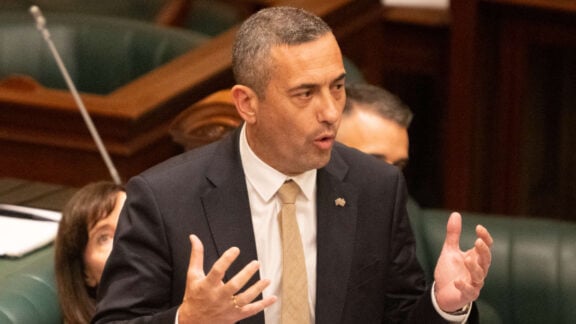When the church bell of his village on the Greek island of Rhodes furiously began ringing Monday to warn residents to flee the approaching flames, Giorgos Latos was sipping his morning coffee.
“Suddenly, we saw the fire just outside” the village of Asklipio, the 83-year-old pensioner told AFP as wildfires fanned by strong winds have been raging on the popular eastern Mediterranean tourist destination for a week.
Some 30,000 people fled the flames at the weekend in what authorities called the country’s largest-ever wildfire evacuation.
Without a shirt on his back, Latos tried to flee in his car, only to be cornered by the fire and forced to turn back.
He was eventually taken to a safe location by firefighters, but had to abandon the car.
“We are living a nightmare… I fear for our village,” said fellow Asklipio resident Eleni Diakogianni, who bemoaned that firefighters would not allow her to assist efforts to save her home.
Rhodes, which counted 2.5 million visitor arrivals in 2022, is one of Greece’s leading holiday destinations.
Many tourists are now scrambling to get home on evacuation flights, as are seasonal hotel workers whose employment is now in doubt.
The island’s airport on Monday had the appearance of a makeshift camp, with travellers and seasonal workers sprawled on the floor on beach towels, many of them still in their swimwear.
Nigerian seasonal workers Audrey and Marylin, who did not wish to give their surnames, were employed in Lindos, the site of Rhodes’ famed ancient Acropolis.
They said the fire took hotel operators by surprise.

‘Everything changed
“We knew there were fires but they seemed far away. And suddenly everything changed,” Audrey said.
“There was no evacuation plan,” she added.
Marylin, who recalled that both hotel guests and staff were scared, said the pair fled on their own, and are now trying to make their way back home to Budapest.
Several European countries set up consular offices at the airport on Sunday evening to help their nationals fly back.
“It’s getting better but a lot of planes are full, so you have to be patient. The situation should normalise in a few days,” said a French consulate representative, speaking on condition of anonymity.
“Some tour operators do not respond, so holidaymakers find themselves helpless and turn to us,” the representative added.
As most hotels are full, emergency accommodation has been set up by the Greek authorities in public buildings, gyms and conference halls.
Hotels are trying to prioritise the most urgent cases, said Manolis Markopoulos, head of the association of Rhodes hoteliers.
“We managed the situation as best we could in this gigantic evacuation,” Markopoulos said.
“Everyone has been rescued and is now in safe places. No one is hungry or thirsty,” he added.
The fire service is not ruling out the possibility of arson, but local resident Maria Dalouka says it’s now painfully clear that people need to take better care about leaving flammable waste in wooded areas.
“It’s not like the old days, climate change has impacted us and will continue to do so,” said the 66-year-old, who owns a cafe in the fire-ravaged village of Kiotari.
“We ask for help from all of Europe… everything is black, please come and let’s plant some trees,” she said.

Corfu and Evia still burning on Tuesday, 25 July
Authorities evacuated nearly 2,500 people from the Greek island of Corfu on Monday as the prime minister warned that the heat-battered nation was “at war” with several wildfires and spoke of three difficult days ahead.
Tens of thousands of people have already fled blazes on the island of Rhodes, with many frightened tourists scrambling to get home on evacuation flights.
About 2,400 visitors and locals were evacuated from the Ionian tourist island of Corfu from Sunday into Monday, a fire service spokesman said, adding that the departures were a precaution.
Fires were also burning on Greece’s second largest island of Evia on Monday.
“We are at war and are exclusively geared towards the fire front,” Greek Prime Minister Kyriakos Mitsotakis told parliament, warning that the nation faced “another three difficult days ahead” before high temperatures are forecast to ease.
Vassilis Kikilias, Greece’s civil protection minister, said crews had battled over 500 fires around the country for 12 straight days.
Greece has been sweltering under a lengthy spell of extreme heat that has exacerbated wildfire risk and left visitors stranded in peak tourist season.
The government’s speedy evacuation came after a tragedy in 2018 when over 100 people perished in Greece’s deadliest forest fire at Mati, near Athens, which Mitsotakis on Monday said still “haunts us all”.
‘We walked for six hours’
Because of the wildfires, an annual celebration on Monday to mark the 1974 restoration of democracy in Greece was cancelled.
Rhodes, which counted 2.5 million visitor arrivals in 2022, is one of Greece’s leading holiday destinations.
Travel giant TUI on Monday said it was suspending holiday packages to Rhodes until Friday.
Greek television broadcast images of long lines of people, some in beachwear, lugging suitcases along the island’s roads on Saturday, when the evacuations were ordered.
“We walked for about six hours in the heat,” Kelly Squirrel, a transport administrator from the United Kingdom, told AFP at Rhodes airport.

‘Exhausted and traumatised’
Police said 16,000 people had been transported on land and 3,000 evacuated by sea following the over 30,000 people evacuation. Others had to flee by road or used their own transport after being told to leave the area.
“We are exhausted and traumatised,” said Daniel-Cladin Schmidt, a 42-year-old German tourist waiting to be evacuated with his wife and nine-year-old son.
“There were thousands of people, the buses couldn’t pass, we had to walk for more than two hours,” he told AFP at the airport.
“We couldn’t breathe, we just covered our faces and moved forward.”
Holiday-makers and some locals spent the night in gyms, schools and hotel conference centres on the island.
In the departures hall of the international airport, AFP saw groups of tourists sleeping on the floor, surrounded by luggage.
“We had to lend a woman some of my wife’s clothes because she had nothing to wear,” Kevin Sales, an engineer from England, told AFP. “It was terrible.”
It was ‘hell on Earth’
Several travel companies have halted their inbound tourist flights to Rhodes, and have been helping to ferry foreigners home.
“We ran 10 kilometres (six miles) with all our luggage to escape the flames”, while the temperature was 42 degrees Celsius (108 degrees Fahrenheit), said German tourist Lena Schwarz, after arriving at Hanover airport overnight Sunday into Monday.
The 38-year-old told AFP their journey leaving Rhodes was “hell on Earth”.
Oxana Neb, 50, also arriving at Hanover, said the evacuation had been “very bad”.
“We stayed in the hotel until the end and fire came from all sides,” she said.
She joined other guests running to the beach, eventually abandoning her suitcases on the way, she said.
Like every summer, Greece is plagued by forest fires, often deadly, ravaging tens of thousands of hectares of forest and vegetation.
This summer, Greece experienced one of the longest heatwaves in recent years, according to experts, with the thermometer hitting 45 degrees Celsius at the weekend.
Temperatures eased Monday but were expected to to pick up again on Tuesday and Wednesday.
Rhodes on Tuesday remains at the highest level of fire alert, alongside Crete.
Source: AFP









